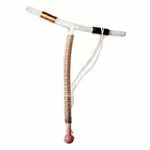
Sometimes even people with the strongest will cannot control their feelings, especially when the matter concerns intimacy and sex. Besides, such things as planning and romantic relations do not come together. No wonder that sometimes passionate lovers remember of protection to prevent pregnancy too late. For this purpose emergency contraception was developed.
Many doctors agree that the most effective contraceptive in emergency cases is an intrauterine device (IUD). Failure rate of the copper device is less than 1%. This makes IUD more attractive than morning after pills, which failure rates are a bit higher.
In addition, IUDs have one more important advantage over the pills: they can be effectively used in 5-6 days after an unprotected sex or in case if the main contraceptive method fails (by the way, some doctors state that IUDs work even in 10 days, though these claims have no official support for the time being). At the same time, emergency contraceptive pills (ECP) produce desirable effect if taken not later than in 72 hours after an unprotected sexual intercourse.

Moreover, in some cases IUD can be the only appropriate method to prevent pregnancy. These include: - contraindication to use emergency contraceptive pills (ECP) due to the liver disease or such rare disorder as porphyria; - the case of current suffering from diarrhea or vomiting, since these conditions can significantly reduce the effectiveness of ECP; - the use of certain drugs (for example, enzyme-inducing drugs antiepileptics or rifampicin) and herbs, which can also interact with pills reducing their efficacy.
 Copper IUD is a small flexible device made of polyethylene or plastic with a copper wire around its stem. It is inserted into the uterus through the cervix to prevent pregnancy. The device has a monofilament nylon tail, which is left in the upper part of the vagina in order to make it possible to remove the contraceptive. IUDs are used as a long-term reversible method of contraception (from 1 to 10 and even 12 years).
Copper IUD is a small flexible device made of polyethylene or plastic with a copper wire around its stem. It is inserted into the uterus through the cervix to prevent pregnancy. The device has a monofilament nylon tail, which is left in the upper part of the vagina in order to make it possible to remove the contraceptive. IUDs are used as a long-term reversible method of contraception (from 1 to 10 and even 12 years).
There are many different IUDs, but the majority of them are T-shaped. Copper contraceptives have a number from 200 to 380 as a part of the name, which indicates the amount of copper in the particular device. The only officially approved copper IUD in the United States is ParaGuard (TCu-380).
Another type of IUDs is progesterone-releasing intrauterine devices as, for example, Mirena. Such contraceptives are capable of reducing menstrual cramps and blood loss due to the progesterone action. However, failure rate of such devices is about 3%, which is a significant disadvantage in comparison to the copper IUDs.
Copper and progesterone containing IUDs are said to work similarly in several directions: they thicken cervix mucus, thus making it harder for the sperm to enter the uterus, and have spermicidal action, which means they kill sperm. IUDs start working right after insertion and their activity takes place in the cervical mucus, in the uterine cavity and in the fallopian tubes. Therefore, IUDs prevent fertilization, which means they are not abortifacients.
Modern IUDs are much safer than the old ones; however, they also have a number of side effects. More frequent adverse reactions are: excessive bleeding during and spotting between menstrual periods and temporary cramping following the insertion. Expulsion and the risk of pelvic inflammatory diseases are also among the possible side effects of the IUDs. Sometimes women report of the lost tail of the device. Embedding, as well as perforation of the uterus and entering the abdomen are unlikely to happen with the newer contraceptives, though such cases took place at the dawn of the IUDs development.
Intrauterine devices are the most widely used contraceptives around the world. About 25% of European women rely on them to prevent pregnancies. However, the United States are an exclusion: here only 1% of women use this contraception method. Nevertheless, this way of pregnancy prevention should not be underestimated or excluded while making a decision, since it undoubtedly has its advantages.
Ivanna
| Tip for you : Sign-in with Your OpenID and post faster, easier and with easy access to all your past posts. | |
|
Your Nick: |















